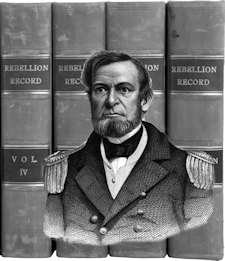January 15.—This day, the steamers blockading the Rappahannock River, observed a schooner coming out of Thompson’s Creek, about a mile and a half from the mouth of the river, and standing up the river, as if to make away from the gunboats, keeping close to the shore. The Mystic was ordered to give chase, and succeeded in beaching the schooner, when the crew of the latter vessel deserted her, and made the shore in safety.
Two boats were lowered from the Mystic, and the tars took possession of the schooner, when they were fired on by a party of rebels, some five hundred yards distant, with canister, apparently from a howitzer. The balls passed over them, and no one was injured. The Mystic then opened fire, and shelled the surrounding woods, covering the retreat of the boats.
The gunboat Dawn then moved up to assist the Mystic, and fired four shells at different points, without any reply being made by the rebels. The Dawn then proceeded higher up the river, and closer into shore, when she was fired on from a rifled piece, placed some distance up the beach. No damage was done, however, and it was discovered that the rebels had a howitzer and a rifled cannon, which they were moving up or down as necessary, and that no battery was to be found.
The schooner was burned, and the gunboats returned to their station at the mouth of the river.
—A correspondence has passed between Price, commanding the rebels in Southern Missouri, and General Halleck, in command of the Department of the Missouri, in reference to the disposal of bridge-burners, and other rebels, captured by the Federal forces. Price states that he has information that certain citizens, soldiers, and bridge-burners, have been shot, which statement he can not believe. Nevertheless, he propounds certain questions to General Halleck, the first of which is, whether his men are to be treated as rebels or belligerents. General Halleck replies, that the bridge-burners have been court-martialed, and that “no order of yours (Price’s) can save from punishment spies, marauders, robbers, incendiaries, guerrilla bands, etc., who violate the laws of war.” But if any of Price’s men are captured in the garb of soldiers, they shall be treated as prisoners of war. He promises further communication with Price, when he shall receive instructions from his Government.
—Edwin M. Stanton’s nomination, as Secretary of War, was confirmed. Mr. Lincoln’s nomination of Mr. Stanton was received with great favor by the loyal Democratic press. They regarded it as an indication of a more cordial union of parties, in the great work of sustaining the Government
— The Second regiment of Ohio Cavalry, (Ben. Wade Brigade,) under the command of Colonel Doubleday, passed through Cincinnati, on their way to Leavenworth, Kansas. The regiment numbers one thousand two hundred and forty men, with one thousand one hundred and eighty-four horses. — Cincinnati Gazette, January 16.
—The following notice was published in Barren County, Ky., this day:
“All free white males of Barren County, between the ages of eighteen and forty-five years, who will not volunteer in the Confederate service, who have a gun or guns, are required to deliver said gun or guns, within twenty days, in Glasgow, Ky., at the office of the undersigned, Inspector of Arms for Barren County. All persons, within the ages above named, who have taxable property to the value of five hundred dollars, and upwards, who have no gun, will attend at the office aforesaid, at the time aforesaid, and make oath to the same, and pay twenty dollars. For which amount, and all guns that are delivered, the said inspector will receipt; which receipt will be evidence of debt against said Confederate Government. All persons, failing to comply with this requisition, will subject themselves to a fine of fifty dollars, and imprisonment until said fine is paid. The undersigned is authorized to receive, accept and qualify, volunteers for the Confederate service, for the term of twelve months.
Z. McDaniel,
Inspector of Arms, Barren County.



